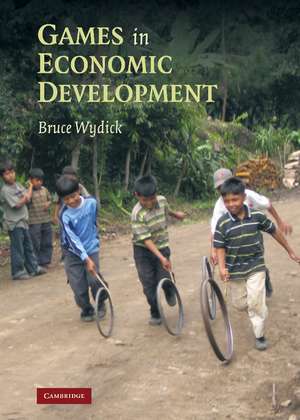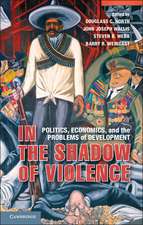Games in Economic Development
Autor Bruce Wydicken Limba Engleză Hardback – 13 ian 2008
| Toate formatele și edițiile | Preț | Express |
|---|---|---|
| Paperback (1) | 330.09 lei 6-8 săpt. | |
| Cambridge University Press – 23 dec 2007 | 330.09 lei 6-8 săpt. | |
| Hardback (1) | 705.24 lei 6-8 săpt. | |
| Cambridge University Press – 13 ian 2008 | 705.24 lei 6-8 săpt. |
Preț: 705.24 lei
Preț vechi: 820.05 lei
-14% Nou
Puncte Express: 1058
Preț estimativ în valută:
134.98€ • 140.39$ • 113.12£
134.98€ • 140.39$ • 113.12£
Carte tipărită la comandă
Livrare economică 13-27 martie
Preluare comenzi: 021 569.72.76
Specificații
ISBN-13: 9780521867580
ISBN-10: 0521867584
Pagini: 314
Ilustrații: 3 tables
Dimensiuni: 180 x 260 x 20 mm
Greutate: 0.73 kg
Ediția:1
Editura: Cambridge University Press
Colecția Cambridge University Press
Locul publicării:New York, United States
ISBN-10: 0521867584
Pagini: 314
Ilustrații: 3 tables
Dimensiuni: 180 x 260 x 20 mm
Greutate: 0.73 kg
Ediția:1
Editura: Cambridge University Press
Colecția Cambridge University Press
Locul publicării:New York, United States
Cuprins
1. Economic development, interdependence, and incentives; 2. Games; 3. Development traps and coordination games; 4. Rural poverty, development, and the environment; 5. Risk, solidarity networks, and reciprocity; 6. Understanding agrarian institutions; 7. Savings, credit, and microfinance; 8. Social learning and technology adoption; 9. Property rights, governance, and corruption; 10. Conflict, violence, and development; 11. Social capital; 12. The political economy of trade and development.
Recenzii
'Games in Economic Development presents a unified view of the difference between the rich countries and the third world. The rich countries have institutions that counteract many different co-ordination failures that plague the third world. Bruce Wydick explains those failures theoretically, and he illustrates them beautifully with many colorful and convincing examples. Some of these are from his own experience in Guatemala. Yes, this is what economic development is all about.' George Akerlof, Nobel Laureate in Economics, 2000, University of California at Berkeley
'Drawing from a voluminous literature, this book illustrates a number of important economic concepts with simple game theory examples. The tone is student-friendly, the presentation insightful and entertaining … an excellent companion to courses in the economics of development and institutional change, and relevant reading for development practitioners.' Marcel Fafchamps, Oxford University
'Game theory explains how rational, far-seeing individuals left to their own devices may fail to achieve social rationality. The emergence of game theory shifted the focus of development economics from relationships of production to relationships among people. Bruce Wydick's book provides a lively introduction to the game-theoretic perspective on economic development. Telling examples explain why public school teachers in poor countries are so often absent, why deworming programs that could make everyone better off fail, why rational farmers may adopt the wrong technology, and how corruption becomes entrenched. A broad and up-to-date survey of patterns of interaction that contribute to the persistence of poverty or create an escape hatch.' Karla Hoff, Senior Research Economist, The World Bank
'In Games in Economic Development, Bruce Wydick begins to bring to life the academics of game theory with the practicalities of economic development in the field. The work provides practitioners with a fresh and relevant framework for evaluating dilemmas faced in the field of economic development and comprehending options for interventions. It breaches the divide between academic theory and practical development issues in a way that sheds understanding and clarity to the discussion of the subject.' Jim Reiff, CEO - Growing Opportunity Finance (India), member of the Opportunity International Network
'This a clear, engaging and thoughtful text. But in Games in Economic Development, Wydick also makes an important and controversial argument. The fundamental origins of development and underdevelopment are not to be found in variations in natural or human resources or in exploitative international economic interactions, but rather in the institutions and social norms that have facilitated economic growth in some societies and undermined it in others. Wydick makes this case primarily through the use of theoretical arguments, explaining and using the tools of simple game theory to shed light on wide range of vital questions in development economics. This is an exciting intellectual program, well-summarized in this book.' Chris Udry, Yale University
'Drawing from a voluminous literature, this book illustrates a number of important economic concepts with simple game theory examples. The tone is student-friendly, the presentation insightful and entertaining … an excellent companion to courses in the economics of development and institutional change, and relevant reading for development practitioners.' Marcel Fafchamps, Oxford University
'Game theory explains how rational, far-seeing individuals left to their own devices may fail to achieve social rationality. The emergence of game theory shifted the focus of development economics from relationships of production to relationships among people. Bruce Wydick's book provides a lively introduction to the game-theoretic perspective on economic development. Telling examples explain why public school teachers in poor countries are so often absent, why deworming programs that could make everyone better off fail, why rational farmers may adopt the wrong technology, and how corruption becomes entrenched. A broad and up-to-date survey of patterns of interaction that contribute to the persistence of poverty or create an escape hatch.' Karla Hoff, Senior Research Economist, The World Bank
'In Games in Economic Development, Bruce Wydick begins to bring to life the academics of game theory with the practicalities of economic development in the field. The work provides practitioners with a fresh and relevant framework for evaluating dilemmas faced in the field of economic development and comprehending options for interventions. It breaches the divide between academic theory and practical development issues in a way that sheds understanding and clarity to the discussion of the subject.' Jim Reiff, CEO - Growing Opportunity Finance (India), member of the Opportunity International Network
'This a clear, engaging and thoughtful text. But in Games in Economic Development, Wydick also makes an important and controversial argument. The fundamental origins of development and underdevelopment are not to be found in variations in natural or human resources or in exploitative international economic interactions, but rather in the institutions and social norms that have facilitated economic growth in some societies and undermined it in others. Wydick makes this case primarily through the use of theoretical arguments, explaining and using the tools of simple game theory to shed light on wide range of vital questions in development economics. This is an exciting intellectual program, well-summarized in this book.' Chris Udry, Yale University
Notă biografică
Descriere
This book looks at economic development issues primarily through the use of game theory.













